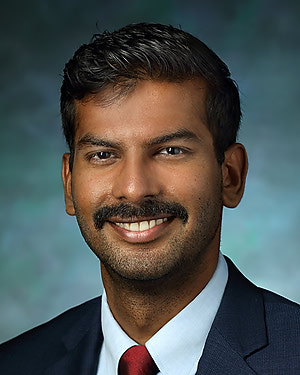Alexander Daniel, DDS

- Director, General Practice Residency Program
- Assistant Professor of Dental and Oral Medicine
Primary Location: Johns Hopkins Outpatient Center, Baltimore, MD
The General Practice Residency Program offered by Johns Hopkins University School of Medicine is a one-year opportunity in hospital dentistry. It is conducted at The Johns Hopkins Hospital, which is affiliated with the university. Currently, the program accepts three residents annually.
Throughout the year, residents primarily engage in general dentistry, working on complex cases alongside various specialists. This takes place within the clinics of Dentistry-Oral and Maxillofacial Surgery, a division of Johns Hopkins Otolaryngology-Head and Neck Surgery, which provides comprehensive support for all program activities. Additionally, residents undergo two months of rotations in anesthesia and emergency medicine.
The program offers a diverse curriculum encompassing various disciplines, including clinical dentistry, emergency medical care, inpatient care and hospital administration, pain control and anesthesiology, oral surgery, oral pathology, practice management, research, special patient care, and temporomandibular disorders.
Our residency program participates in the American Dental Education Association's Postdoctoral Application Support Service (PASS).
The deadline for submitting applications through PASS is October 1st.
Here are the application requirements:
Please refrain from sending any additional documents to the program. The residency director will reach out to you if any further materials are necessary.
Applicants are selected for interviews based on their academic achievements, personal essay, and Professional Evaluations (PEF). If your application meets the criteria, you will be contacted for an interview. The chosen applicants will be invited to interview on a Saturday in October.
It's important to note that our General Practice Residency program does not participate in the Postdoctoral Dental Matching Program administered by National Matching Services.
Here are the requirements for matriculation:
The goals of the Johns Hopkins General Practice Residency Program are to:
The didactic curriculum is comprised of seminars/lectures on a variety of dental and medical topics. We have a wide range of specialists from maxillofacial surgeons, endodontist, maxillofacial prosthodontist, TMD specialist, general dentists and pediatric dentist who routinely lecture on a variety of topics. Topics include but are not limited to:
In addition to lectures our residents participate and present in Treatment Planning Case Conferences, Literature Reviews, Implant Workshops, Endodontic workshops, Hospital Credentialing/Organization and Orientation.
Residents are also required to do Rotations at the hospital:
Residents will be assigned to an Anesthesia Rotation with supervised experiences in the following:
Residents will be assigned to an Emergency Department Rotation with supervised experiences to include:

Primary Location: Johns Hopkins Outpatient Center, Baltimore, MD
Dental School: University of Maryland

Dental School: University of Pennsylvania

Dental School: University of Kentucky





